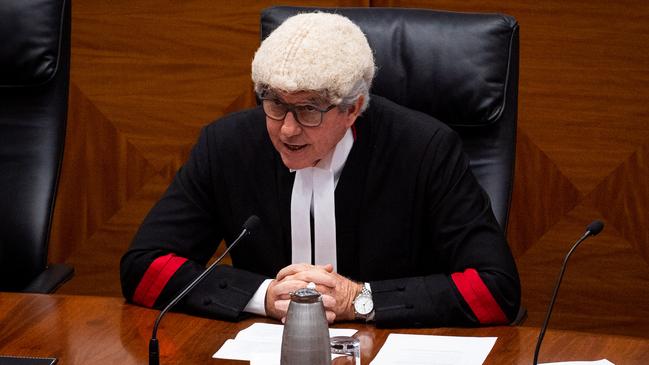NT Chief Justice Michael Grant lambastes decision of Local Court judge to disregard Sentencing Act
The Northern Territory’s Chief Justice has criticised a decision by a Local Court judge to give a slap on the wrist for an assault that resulted in spinal fractures, but found he is powerless to reverse it.

Police & Courts
Don't miss out on the headlines from Police & Courts. Followed categories will be added to My News.
The Northern Territory’s Chief Justice has strongly criticised a decision by a Local Court judge to give a slap on the wrist for an assault that resulted in spinal fractures, but found he is powerless to reverse it due to legislative changes.
Last year, Mark Murray, 59, pleaded guilty to aggravated assault after he pushed his victim three times to the chest, causing the man to fall onto a pile of beer kegs.
The man sustained four fractures to his lumbar spine and bruising.
Judge David Woodroffe fined Murray and did not record a conviction, on the basis Murray had no prior convictions for violent offending and that physical harm – as required under s188(2) of the Criminal Code Act 1983 – had not been established.
The Director of Public Prosecutions appealed the decision, on the basis that Judge Woodroffe imposed a sentence contrary to law, in that s78DC of the Sentencing Act 1995 stipulated a mandatory minimum sentence of actual imprisonment, with a conviction to necessarily follow.
Last week, Supreme Court Justice Michael Grant ruled that although the decision of his lower court colleague was variously “nonsensical,” “remarkable” and “plainly wrong,” he could not overturn it as s78DC was no longer in force, it being superseded by the Sentencing and Other Legislation Amendment Act 2022 on March 25 this year.

Regarding Judge Woodroffe’s finding that physical harm had not been established, Chief Justice Grant said this was “plainly wrong,” as it had been “explicitly agreed” in the statement of facts, tendered as evidence, that the victim suffered physical harm.
“It must necessarily have been apparent to the sentencing judge from the description of the injuries contained in the agreed facts that they constituted ‘physical harm’,” Chief Justice Grant said.
He was even more scathing when it came to the misapplication of s78DC of the Sentencing Act 1995.
According to Chief Justice Grant, Judge Woodroffe circumvented the mandatory minimum by telling the court he would “read down” (i.e. narrow the scope of interpretation to avoid infringing other principles) the section, as courts “have a full discretion in sentencing”.
This statement was “nonsensical,” Chief Justice Grant said, as “reading down” is only open to judges where there is ambiguity in a legislative provision, which did not exist in this case.
Chief Justice Grant said it was unclear if Judge Woodroffe’s circumvention of s78DC was accidental or deliberate.
If it was the former, it would be “remarkable” as it would have occurred in the face of a plethora of evidence and legal precedent.
If the latter, this would represent a deliberate trammelling of the legislature’s prerogative to set the laws of the land.
However, it was ultimately a moot point due to the amendments that came into force on March 25, meaning it was no longer mandatory to sentence first-time aggravated assault offenders to actual imprisonment, Chief Justice Grant found.





